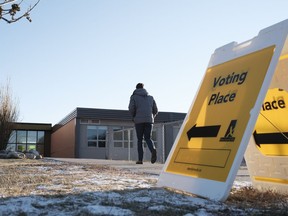The collective wisdom of voters is shrinking because fewer voters are contributing to it by casting ballots.

Article content
A year ago, Premier Scott Moe called three byelections with disastrous results for the province.
The disaster wasn’t that the NDP took the two urban seats, Regina Coronation Park and Regina Walsh Acres, that were previously held by Saskatchewan Party MLAs.
Nor was the problem that the Sask. Party retained the rural seat of Lumsden-Morse (although, with only 53.2 per cent of the popular vote compared with 73.4 per cent in the riding in the 2020 general election — numbers that, as it turned out, proved rather consequential when it came to government policy making).
Advertisement 2
Article content
It doesn’t matter whether any individual thinks the voters are right or wrong, because the majority wisdom of the electorate is always right.
Herein lies the problem. Without passing judgment, the collective wisdom of voters is shrinking, because less voters are contributing to it by casting a ballot.
Consider the aforementioned byelections last summer, which are part of a sad trend in the democratic world where fewer and fewer are motivated to vote.
It’s really affording politicians the excuse of being influenced by those who show up … although not always.
Interestingly, the best turnout in Regina Coronation Park was actually a surprising 6,715 out of 10,835 voters, or 61.8 per cent, showing up in the middle of August to cast their ballots.
The message the Sask. Party should have received was the one delivered by its former speaker Mark Docherty: That “there isn’t anything here” for the voters of that riding.
But likely out of fear of others penetrating the Sask. Party’s near-impenetrable rural stronghold, Premier Scott Moe chose to hear from Lumsden-Morse voters. There, Saskatchewan United Party leader Jon Hromek garnered 22.7 per cent of the byelection vote last year, running hard on the issue of parental rights.
Article content
Advertisement 3
Article content
What resulted was Bill 137, the Parental Bill of Rights or “pronoun bill” that enacted the post-byelection policy of forcing teachers — regardless of better judgment and circumstances — to inform parents or guardians if a child changed the pronoun or name they used in school.
Suffice it to say, the legislation was rightly criticized from coast to coast in legal, academic, education and human rights circles and would have never stood had the government not twice invoked the notwithstanding clause of the Charter of Rights and Freedoms.
But it was surely also the response for which those lobbyists were hoping. As Leader-Post reporter Larissa Kurz found out through Freedom of Information filings, they threatened to actively campaign against the Sask. Party
With only 5,053 of 13,391 voters in Lumsden-Morse showing up — a paltry 37.2 per cent voter turnout — one can see how the Sask. Party had cause for worry.
Besides, byelections normally have low turnouts, and these particular byelections, called by Moe in the dog days of summer, were constructed for low turnouts.
Advertisement 4
Article content
But one got the distinct impression Moe and company simply wrote off those city seats … or at least, hoped for some miracle caused by low voter turnout.
One can’t feel much sympathy for the Sask. Party — or any other government — being hoisted on its own petard. (One of the most unforgivable things done by the last NDP government was calling the 1999 election in September to discourage the farm vote from turning out in the middle of harvest.)
When only 37.2 per cent show up to vote, parties are more susceptible to the whims of those who do … or at least, are more inclined to cater to what they perceive as the issues of those who showed up.
And over the last 40 years in Saskatchewan, fewer and fewer have voted: in 1982, 79.8 per cent; in 1986, 76.8; in 1991, 77.4; in 1995, 57.4; in 1999, 55.9; in 2003, 58.3; in 2007, 60.8; in 2011, 51.1; in 2016 53.5, and in 2020, 52.9.
Blame governments for discouraging voters if you wish, but we have lost a quarter of Saskatchewan’s voters in the last 30 to 40 years.
Perhaps past higher turnouts didn’t always stop bad governance. And maybe they still won’t in the future.
Advertisement 5
Article content
But it sure feels as if we are losing that coalition of common sense accompanying a true majority consensus.
Mandryk is the political columnist for the Regina Leader-Post and the Saskatoon StarPhoenix.
Recommended from Editorial
Our websites are your destination for up-to-the-minute Saskatchewan news, so make sure to bookmark thestarphoenix.com and leaderpost.com. For Regina Leader-Post newsletters click here; for Saskatoon StarPhoenix newsletters click here
Article content







